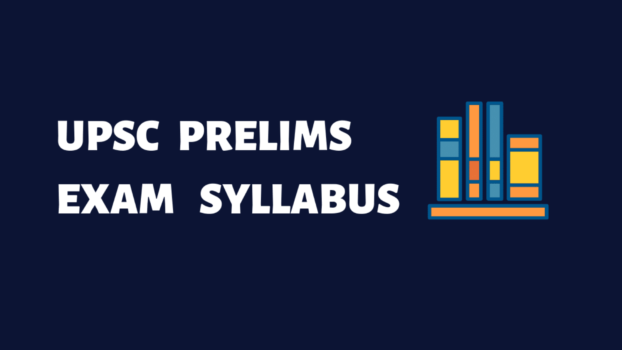The UPSC Civil Services Examination is one of the most challenging and prestigious exams in India. The first stage of this exam, the Preliminary Examination (Prelims), is a crucial hurdle that determines your eligibility to proceed to the Main Examination. This article will provide a comprehensive overview of the UPSC syllabus for prelims, focusing on the key areas you need to cover for success.
UPSC Prelims: A Crucial First Step
The UPSC Prelims is an objective-type paper consisting of two papers:
- Paper I: General Studies
- This paper covers a wide range of topics, including current events of national and international importance, history, geography, polity, economy, science and technology, and environment and ecology.
- Paper II: Civil Services Aptitude Test (CSAT)
- This paper evaluates your comprehension, analytical abilities, decision-making skills, and problem-solving abilities. It includes topics like basic numeracy, data interpretation, logical reasoning, and decision-making.
UPSC Prelims Syllabus: Paper I – General Studies
Let’s delve deeper into the vast syllabus of Paper I:
- Current Events of National and International Importance: This is a dynamic and crucial section. Stay updated with major national and international events, including:
- Politics: Government policies, elections, political parties, and international relations.
- Economics: Economic growth, inflation, budget, trade, and international economic institutions.
- Social Issues: Poverty, inequality, education, healthcare, and social justice.
- Science and Technology: Space exploration, advancements in medicine, artificial intelligence, and climate change.
- Environment and Ecology: Environmental pollution, climate change, biodiversity conservation, and environmental laws.
- History of India:
- Ancient India: Indus Valley Civilization, Vedic Age, Mauryan Empire, Gupta Empire.
- Medieval India: Delhi Sultanate, Mughal Empire, Bhakti and Sufi movements.
- Modern India: Indian National Movement, freedom struggle, and post-independence India.
- Indian National Movement:
- Focus on key personalities, events, and ideologies that shaped the Indian freedom struggle.
- Understand the various phases of the movement, from early resistance to the culmination in independence.
- Indian and World Geography – Physical, Social, Economic Geography of India and the World:
- Physical Geography: Mountains, rivers, plateaus, climate, and natural resources.
- Social Geography: Population distribution, urbanization, and social and cultural aspects.
- Economic Geography: Agriculture, industries, transportation, and international trade.
- Indian Polity and Governance – Constitution, Political System, Panchayati Raj, Public Policy, Rights Issues, etc.:
- Constitution of India: Fundamental Rights, Directive Principles of State Policy, and the structure of the Indian government.
- Political System: Parliament, judiciary, and the role of political parties.
- Panchayati Raj: Decentralization of power and grassroots democracy.
- Public Policy: Formulation and implementation of government policies.
- Rights Issues: Human rights, women’s rights, and minority rights.
- Economic and Social Development – Sustainable Development, Poverty, Inclusion, Demographics, Social Sector Initiatives, etc.:
- Economic Development: Economic growth, poverty reduction, and sustainable development goals.
- Social Development: Education, healthcare, and social sector initiatives.
- Demographics: Population growth, urbanization, and demographic trends.
- Social Issues: Poverty, inequality, and social justice.
- Environmental Ecology, Biodiversity, and Climate Change – Environmental Pollution and Degradation, Conservation, Environmental Impact Assessment:
- Environmental Pollution: Air, water, and soil pollution.
- Climate Change: Causes, effects, and mitigation measures.
- Biodiversity Conservation: Importance of biodiversity and conservation efforts.
- Environmental Impact Assessment: Assessing the environmental impact of development projects.
- General Science:
- Basic concepts of physics, chemistry, and biology.
- Space science, technology, and advancements in medicine.
UPSC Prelims Syllabus: Paper II – Civil Services Aptitude Test (CSAT)
This paper assesses your analytical and problem-solving abilities. Key areas include:
- Comprehension: Reading passages and answering questions based on understanding.
- Data Interpretation: Analyzing charts, graphs, and tables to draw conclusions.
- Logical Reasoning and Analytical Ability: Solving puzzles, syllogisms, and other logical problems.
- Decision Making and Problem Solving: Evaluating situations and making informed choices.
- Basic Numeracy: Arithmetic, data interpretation, and basic statistical concepts.
Tips for Preparing for the UPSC Prelims
- Understand the Syllabus In-Depth: A thorough understanding of the UPSC syllabus for prelims is crucial.
- Break down the syllabus into smaller, manageable units.
- Identify your strengths and weaknesses.
- Develop a Comprehensive Study Plan:
- Create a realistic and achievable study schedule.
- Allocate sufficient time for each subject.
- Include regular breaks and revision sessions.
- Gather Relevant Study Material:
- Refer to standard textbooks, NCERT books, and other reliable sources.
- Utilize online resources, such as online courses, mock tests, and current affairs websites.
- Focus on Current Affairs:
- Stay updated with daily news from reputable sources.
- Read newspapers, magazines, and online news portals regularly.
- Make notes on important events and developments.
- Practice Regularly:
- Solve previous year’s question papers and mock tests regularly.
- Analyze your performance and identify areas for improvement.
- Time yourself during practice sessions to simulate exam conditions.
- Develop Analytical and Critical Thinking Skills:
- Read extensively and critically analyze information.
- Engage in discussions and debates to enhance your analytical abilities.
- Practice solving puzzles and logical problems to improve your problem-solving skills.
- Stay Motivated and Consistent:
- The UPSC Prelims requires sustained effort and dedication.
- Stay motivated by setting realistic goals and celebrating your achievements.
- Maintain a healthy lifestyle and avoid burnout.
- Seek support from friends, family, and mentors.
- Focus on Conceptual Understanding:
- Don’t just memorize facts; strive to understand the underlying concepts.
- Connect different topics and build a holistic understanding of the subject matter.
- Develop a strong foundation in fundamental concepts.
- Revise Regularly:
- Regular revision is crucial to reinforce learning and improve retention.
- Schedule regular revision sessions throughout your preparation.
- Use techniques like mind mapping and flashcards to aid in revision.
- Join a Test Series:
- Enrolling in a test series can help you:
- Assess your preparation level.
- Identify your strengths and weaknesses.
- Improve your time management skills.
- Get familiar with the exam pattern and difficulty level.
- Enrolling in a test series can help you:
- Stay Updated with Current Affairs:
- Utilize reliable sources: Read newspapers like The Hindu, Indian Express, and The Times of India.
- Follow news channels and websites like PIB, PRS Legislative Research, and Down to Earth.
- Make notes on important events and developments.
- Utilize current affairs magazines and online resources.
Importance of Current Affairs in UPSC Prelims
Current affairs play a pivotal role in the UPSC Prelims. Here’s why:
- Significantly weightage: Current affairs are extensively covered in Paper I – General Studies.
- Dynamic nature: The world is constantly evolving, and the UPSC exam reflects these changes.
- Interdisciplinary nature: Current affairs often intersect with various subjects like history, geography, polity, economy, and environment.
- Helps in understanding concepts: Current events provide real-world examples and applications of theoretical concepts.
How to Stay Updated with Current Affairs
- Read newspapers daily: Develop a habit of reading newspapers regularly. Focus on editorials, opinion pieces, and news related to national and international affairs.
- Follow news channels: Watch news channels like DD News, Rajya Sabha TV, and Lok Sabha TV for in-depth analysis and discussions on current events.
- Utilize online resources: Follow reliable news websites, blogs, and social media pages.
- Read magazines: Subscribe to current affairs magazines like Yojana, Kurukshetra, and Frontline.
- Make notes: Summarize important events and developments in your own words.
- Utilize online resources: Utilize online platforms like PIB, PRS Legislative Research, and Down to Earth for reliable information and analysis.
Recommended Resources for UPSC Prelims
- Standard Textbooks: NCERT textbooks are considered the foundation for UPSC preparation.
- Reference Books:
- Laxmikanth (Indian Polity)
- Spectrum (Modern India)
- Ramesh Singh (Indian Economy)
- Geography of India by Majid Husain
- Shankar IAS (Environment)
- Online Resources:
- Insights on India
- IASbaba
- Unacademy
- Mrunal
- Civilsdaily
- Current Affairs Magazines:
- Yojana
- Kurukshetra
- Frontline
UPSC Prelims: A Challenging but Rewarding Journey
The UPSC Prelims is undoubtedly a challenging exam, but with consistent effort, dedication, and a well-structured approach, you can increase your chances of success. Remember to:
- Understand the syllabus thoroughly.
- Develop a comprehensive study plan.
- Gather relevant study material.
- Focus on current affairs.
- Practice regularly.
- Stay motivated and consistent.
The journey of UPSC preparation may be demanding, but the rewards are immense. It not only prepares you for the Civil Services Examination but also equips you with valuable knowledge, skills, and perspectives that will benefit you throughout your life.
I hope this comprehensive guide on the UPSC syllabus for prelims proves helpful in your preparation. Best of luck!
Disclaimer: This article is for informational purposes only and should not be considered professional advice.
Note: The information provided in this article may be subject to change. Please refer to the official UPSC website for the most up-to-date information.
Discover more from ExamQuestIndia: The Best Exam Prep Platform in India
Subscribe to get the latest posts sent to your email.







